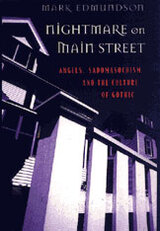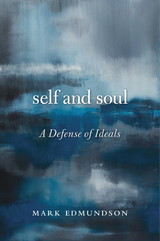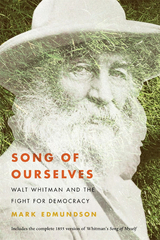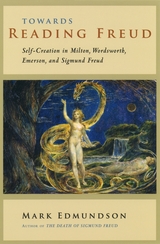
Once we've terrified ourselves reading Anne Rice or Stephen King, watching Halloween or following the O. J. Simpson trial, we can rely on the comfort of our inner child or Robert Bly's bongos, an angel, or even a crystal. In a brilliant assessment of American culture on the eve of the millennium, Mark Edmundson asks why we're determined to be haunted, courting the Gothic at every turn--and, at the same time, committed to escape through any new scheme for ready-made transcendence.
Nightmare on Main Street depicts a culture suffused with the Gothic, not just in novels and films but even in the nonfictive realms of politics and academic theories, TV news and talk shows, various therapies, and discourses on AIDS and the environment. Gothic's first wave, in the 1790s, reflected the truly terrifying events unfolding in revolutionary France. What, Edmundson asks, does the ascendancy of the Gothic in the 1990s tell us about our own day?
And what of another trend, seemingly unrelated--the widespread belief that re-creating oneself is as easy as making a wish? Looking at the world according to Forrest Gump, Edmundson shows how this parallel culture actually works reciprocally with the Gothic.
An unchecked fixation on the Gothic, Edmundson argues, would result in a culture of sadomasochism. Against such a rancorous and dispiriting possibility, he draws on the work of Nietzsche and Shelley, and on the recent creations of Toni Morrison and Tony Kushner, to show how the Gothic and the visionary can come together in persuasive and renovating ways.

An ARTery Best Book of the Year
An Art of Manliness Best Book of the Year
In a culture that has become progressively more skeptical and materialistic, the desires of the individual self stand supreme, Mark Edmundson says. We spare little thought for the great ideals that once gave life meaning and worth. Self and Soul is an impassioned effort to defend the values of the Soul.
“An impassioned critique of Western society, a relentless assault on contemporary complacency, shallowness, competitiveness and self-regard…Throughout Self and Soul, Edmundson writes with a Thoreau-like incisiveness and fervor…[A] powerful, heartfelt book.”
—Michael Dirda, Washington Post
“[Edmundson’s] bold and ambitious new book is partly a demonstration of what a ‘real education’ in the humanities, inspired by the goal of ‘human transformation’ and devoted to taking writers seriously, might look like…[It] quietly sets out to challenge many educational pieties, most of the assumptions of recent literary studies—and his own chosen lifestyle.”
—Mathew Reisz, Times Higher Education
“Edmundson delivers a welcome championing of humanistic ways of thinking and living.”
—Kirkus Reviews

In the midst of a crisis of democracy, we have much to learn from Walt Whitman’s journey toward egalitarian selfhood.
Walt Whitman knew a great deal about democracy that we don’t. Most of that knowledge is concentrated in one stunning poem, Song of Myself.
Esteemed cultural and literary thinker Mark Edmundson offers a bold reading of the 1855 poem, included here in its entirety. He finds in the poem the genesis and development of a democratic spirit, for the individual and the nation. Whitman broke from past literature that he saw as “feudal”: obsessed with the noble and great. He wanted instead to celebrate the common and everyday. Song of Myself does this, setting the terms for democratic identity and culture in America. The work captures the drama of becoming an egalitarian individual, as the poet ascends to knowledge and happiness by confronting and overcoming the major obstacles to democratic selfhood. In the course of his journey, the poet addresses God and Jesus, body and soul, the love of kings, the fear of the poor, and the fear of death. The poet’s consciousness enlarges; he can see more, comprehend more, and he has more to teach.
In Edmundson’s account, Whitman’s great poem does not end with its last line. Seven years after the poem was published, Whitman went to work in hospitals, where he attended to the Civil War’s wounded, sick, and dying. He thus became in life the democratic individual he had prophesied in art. Even now, that prophecy gives us words, thoughts, and feelings to feed the democratic spirit of self and nation.

“Marvelous. . . . Edmundson’s book offers an extraordinary challenge both to practicing analysts and to a scholarly community which all too uncomplainingly inhabits and reinforces the Freudian paradigm of interpretation. Edmundson reinvents an adventurous and dissident Freud as an antidote to . . . weary psychoanalytic commonplaces.”—Malcolm Bowie, Raritan
“This book takes a distinguished place in the ongoing effort to recontextualize Freud by stressing the literary, rather than the scientific roots and character of his theory.”—Virginia Quarterly Review
READERS
Browse our collection.
PUBLISHERS
See BiblioVault's publisher services.
STUDENT SERVICES
Files for college accessibility offices.
UChicago Accessibility Resources
home | accessibility | search | about | contact us
BiblioVault ® 2001 - 2024
The University of Chicago Press









